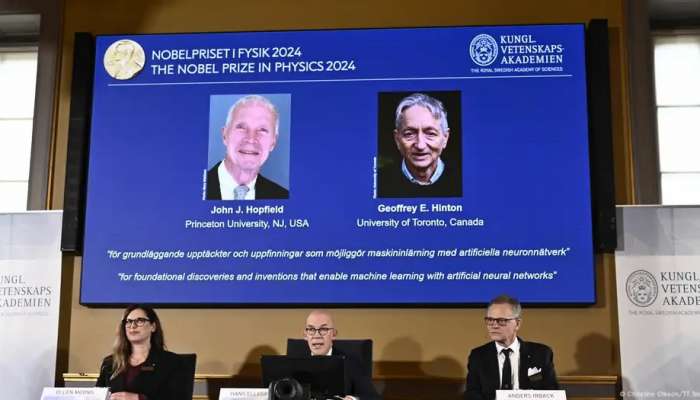
Stockholm: John Hopfield and Geoffrey Hinton have been awarded the Nobel Prize for Physics for their research into enabling machine learning with artificial neural networks.
It follows yesterday's awarding of the Nobel Prize in Physiology to Victor Ambros and Gary Ruvkun. The award for chemistry will be announced on Wednesday.
The Nobel Prize in Physics
has been awarded 118 times to 227 recipients from 1901 to 2024. John Bardeen is the only person to win it twice (in 1956 and 1972), so 226 individuals have received the prize.
The committee, led by noted that machine learning “has long been important for research, including the sorting and analysis of vast amounts of data.”
In announcing the award, the committee led by Hans Ellengren, noted that machine learning “has long been important for research, including the sorting and analysis of vast amounts of data.”
Hinton: 'Machine Learning will exceed people in intellectual abilities'
British-Canadian Nobel Laureate, computer scientist and cognitive psychologist, Geoffrey Hinton spoke to the press shortly after the winners were announced.
"I am flabbergasted, I had no idea this would happen, I am very surprised," Hinton said, when asked how he felt about being a Nobel laureate. He assures that advancements in neural networks will have a huge influence.
"This will be comparable with the industrial revolution. Machine Learning will exceed people in intellectual abilities," he added.
While he listed the numerous applications, such as in healthcare, AI assistents and increase in work productivity, he also pointed out that Machine Learning poses a threat that things could get out of control.
Hinton admitted to using Chat GPT 4 a lot. "I don't totally trust it, as sometimes it can hallucinate;" he added.
"I am in a cheap hotel in California without very good internet or phone connection," he said, as to where he was when he received the news.
AI, machine learning and deep learning - simply explained
Terms like machine learning, Artificial Intelligence and deep learning were used heavily at the Nobel Prize announcements. Advancements in computer science has ked to extensive research in these fields, Hans Ellengren, the Secretary General of the Royal Swedish Academy of Sciences said.
The tech-company IBM describes AI as the umbrella term for machines that mimic human intelligence. Meanwhile Machine Learning (ML) is a subset of AI. It focuses on improving AI systems by teaching them to learn from data and make better predictions.
Deep Learning, which is the focus of Hopfield’s and Hinton’s research, is a more powerful version of machine learning. Deep learning uses deeper layers of neural networks.
Neural Networks are the building blocks of deep learning models, just like neurons are the building blocks in the human nervous system.
Neural Networks form the core of deep learning. These are made up of layers of nodes like neurons in the brain. A simple neural network has only a few layers, but a deep learning model must have more than three layers, which gives it the power to solve more complex problems.